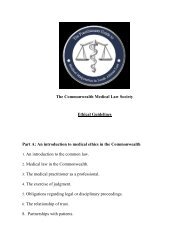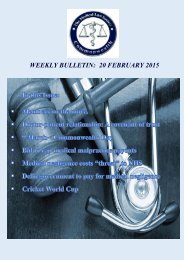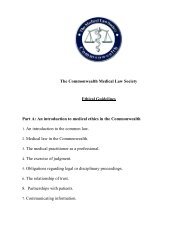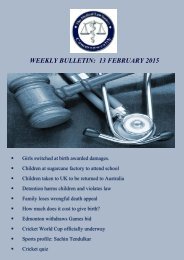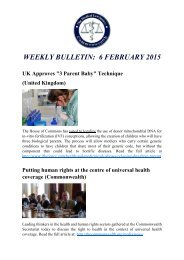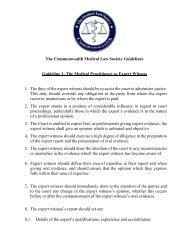SA's shocking medical malpractice crisis
You also want an ePaper? Increase the reach of your titles
YUMPU automatically turns print PDFs into web optimized ePapers that Google loves.
<strong>SA's</strong> <strong>shocking</strong> <strong>medical</strong> <strong>malpractice</strong> <strong>crisis</strong><br />
South Africa is experiencing an explosion in <strong>medical</strong> <strong>malpractice</strong> litigation in the public<br />
and private sector, according to Health Minister Aaron Motsoaledi.<br />
Litigation against healthcare providers has reached <strong>crisis</strong> levels causing practitioners to<br />
shun <strong>medical</strong> specialities, including obstetrics and gynaecology, Health Minister Aaron<br />
Motsoaledi said on Monday.<br />
"The nature of the <strong>crisis</strong> is that our country is experiencing a very sharp increase -<br />
actually an explosion in <strong>medical</strong> <strong>malpractice</strong> litigation - which is not in keeping with<br />
generally known trends of negligence or <strong>malpractice</strong>," Motsoaledi said in Pretoria.<br />
"The cost of <strong>medical</strong> <strong>malpractice</strong> claims has skyrocketed and the number of claims<br />
increased substantially."<br />
Addressing a medico-legal summit in Pretoria, Motsoaledi said when the trend was<br />
initially observed, doctors in public service were blamed for rendering shoddy service.<br />
"Let me make it very clear, the <strong>crisis</strong> we are faced with is not a <strong>crisis</strong> of public<br />
healthcare. It is a <strong>crisis</strong> faced by everybody in the healthcare profession - public and<br />
private. It does not matter where you are," said Motsoaledi.<br />
Specific <strong>medical</strong> specialities were targeted.<br />
"There are four <strong>medical</strong> specialities that are continually, persistently, and mercilessly<br />
being targeted for litigation," said Motsoaledi.<br />
"These are obstetrics and gynaecology, neurosurgery, neonatology, and orthopaedics."<br />
He said the trend was significantly detrimental to the healthcare system.<br />
Motsoaledi said the cost of indemnity insurance for private specialists in neurosurgery<br />
has increased by "a whopping 573%" within a period of eight years between 2005 and<br />
2013.<br />
"The cost of indemnity insurance for private specialists in obstetrics increased by 382%<br />
within a similar period and still growing. All these issues have devastating<br />
consequences to the healthcare system of a country," he said.<br />
Motsoaledi said young doctors were now reluctant to specialise in obstetrics and<br />
gynaecology.<br />
"Those who are too old to change are resorting to procrastinating gynaecology and<br />
refuse to see the woman once she falls pregnant," he said.
Motsoaledi said lawyers leading the litigation against <strong>medical</strong> practitioners were not<br />
doing it for the love of patients.<br />
"They are driven by this pocket-lining phenomenon. They are simply in hospitals<br />
because the platform from which they have been lining their pockets, and not that of the<br />
wronged patients, has now changed."<br />
"Yes, the RAF [Road Accident Fund] has changed. It has been bankrupted by this<br />
pocket-lining behaviour," said Motsoaledi.<br />
He said numerous countries had faced similar problems.<br />
"It is the same <strong>crisis</strong> that occurred in the United States in the early 1970s which was<br />
described as a <strong>crisis</strong> of insurance availability as many insurers exited," he said.<br />
"The second [<strong>crisis</strong>] in the mid-1980s was a <strong>crisis</strong> of affordability with price hikes that<br />
meant doctors found they could not afford to pay for cover."<br />
He said the problem had also been experienced in the United Kingdom and Australia.<br />
http://www.health24.com/News/Public-Health/SAs-<strong>shocking</strong>-<strong>medical</strong>-<strong>malpractice</strong><strong>crisis</strong>-20150309<br />
Don't blame lawyers for <strong>medical</strong> <strong>malpractice</strong> suits – LSSA<br />
The Law Society of SA (LSSA) has raised serious concern over what it describes as<br />
'sweeping statements' by the Minister of Health, Dr Aaron Motsoaledi, and healthcare<br />
organisations 'regarding the possible limitation of the right to fair compensation of<br />
<strong>medical</strong> <strong>malpractice</strong> victims and the role of lawyers in these claims' notes Legalbrief.<br />
In a statement yesterday, the LSSA said: ‘It cannot be that victims of <strong>medical</strong><br />
<strong>malpractice</strong> – who are often the poor and vulnerable – should be expected to have the<br />
specialist knowledge, money or power to take on the state through an “administrative<br />
process” if they have suffered life-changing and critical damage at the hands of the<br />
healthcare system and healthcare practitioners. Such victims have the right to legal<br />
representation and to be compensated<br />
fairly for their losses.'<br />
The LSSA co-chairpersons Max Boqwana and Ettienne Barnard say victims must have<br />
'parity or arms' if they are to challenge the very institutions that caused their loss in the<br />
first place. 'That is the duty of lawyers.' The LSSA leaders urged the Minister to focus<br />
on addressing the dire skills shortages and poor conditions, as well as the duty of<br />
care owed by healthcare professionals and <strong>medical</strong> facilities to patients, rather
than on removing the right to fair and legitimate compensation from victims of<br />
<strong>malpractice</strong>.<br />
They add: ‘Legal practitioners cannot “manufacture” <strong>malpractice</strong> injuries – these are<br />
substantiated by experts. If there is alleged collusion between <strong>medical</strong> professionals and<br />
legal practitioners as well as a downgrading of standards to create an opportunity for<br />
collusion, this must be reported to the relevant statutory provincial law society and to<br />
the law enforcement agencies. If attorneys are found to be over-reaching or overcharging,<br />
the law societies have assessment committees that investigate the allegations<br />
and assess the fees charged. This is regarded as serious misconduct by the profession<br />
and by the courts.’<br />
Lawyers pointed out the Health Department was in an abysmal state.<br />
‘The entire system is riddled with corruption and maladministration and he (the<br />
Minister) then has the temerity to blame the legal profession for his woes,’ Andre Calitz,<br />
chief operating officer for Joseph’s Inc, which is the largest <strong>medical</strong> <strong>malpractice</strong> law<br />
firm in SA, is quoted as<br />
saying in a report on the Health24 site. Calitz said a major problem in the Health<br />
Department is not having a budget for <strong>malpractice</strong> judgments. He said this meant<br />
that funds had to be taken out of the budgets of hospitals and clinics which led to a<br />
shortage of money for drugs and other essentials services. DA health spokesperson,<br />
Jack Bloom also took a swipe at Motsoaledi. He said the Minister must focus at fixing<br />
the ailing health system, which was in <strong>crisis</strong>, rather than blame the legal profession.<br />
‘Medical <strong>malpractice</strong> lawyers render an invaluable service, especially to poor people<br />
who do not have the resources to pursue legal action against <strong>medical</strong> professionals who<br />
have harmed them.’ Bloom said by criticising attorneys, Motsoaledi is also blaming the<br />
courts for not acting in an ethical manner because all the cases had been adjudicated by<br />
the courts.<br />
legalbrief.co.za/diary/legalbrief...lawyers...<strong>medical</strong>-<strong>malpractice</strong>.../pdf
Gauteng <strong>medical</strong> negligence claims up<br />
<br />
<br />
<br />
Gauteng pays R276m for <strong>medical</strong> negligence<br />
Gauteng health dept pays R7.5m for negligence<br />
Gauteng dept tackles health issues<br />
Johannesburg - Claims lodged against the Gauteng health department due to <strong>medical</strong> negligence<br />
were increasing, the department said on Tuesday.<br />
"The reasons for such an increase in the number of claims are numerous and include - an<br />
increased awareness of rights by patients, a worldwide trend, better litigations, a legal profession<br />
that is actively touting patients in hospital wards and a concerning culture of unprofessional<br />
conduct that seems to be on the rise," the department said. The department was concerned by the<br />
increasing number of payouts, and would investigate together with the Health Professions Council<br />
of South Africa (HPCSA).<br />
"Given that these happen while people are performing their duties, the employer is one to respond.<br />
There are various interventions that are in place in all our facilities," the department said.The cases<br />
took a period of more than a year, and it was difficult to determine how much the department has<br />
paid until court judgments were available.<br />
"The department waits for the matters to be put on the court's roll and for all the necessary<br />
processes to be followed before it is informed if or how much should be paid out."<br />
http://www.news24.com/SouthAfrica/News/Gauteng-<strong>medical</strong>-negligence-claims-up-<br />
20150304<br />
Hospital horrors costing SA plenty<br />
A child's penis was amputated by mistake. Babies are born brain-damaged after their<br />
mothers are not properly cared for during labour and an infant went blind after doctors<br />
failed to diagnose a problem at birth.
These are examples of the <strong>medical</strong> negligence that is costing provincial health<br />
departments millions in <strong>malpractice</strong> claims.<br />
Cases of <strong>medical</strong> negligence are increasing nationwide:<br />
The Gauteng health department is facing negligence claims amounting to R1.28-billion<br />
for the 2012/2013 financial year. In 2005, the department expressed concern about<br />
complaints of <strong>malpractice</strong>, which had led to lawsuits of R216-million in the previous<br />
five years.<br />
Eastern Cape faced claims of R876-million last year, up from R4.5-million in 2006.<br />
North West paid out R13.3-million in November for negligence at a state hospital in<br />
Witbank that resulted in a baby becoming blinded. Medical negligence attorney Adele<br />
van der Walt said she was contacted daily by people from across the country who had<br />
suffered negligence at both private and government hospitals.<br />
The most common complaint, say lawyers, is about babies born with cerebral palsy, a<br />
form of brain damage that often occurs when mothers have difficulty giving birth.<br />
Some 68 of the 86 claims against Chris Hani-Baragwanath Hospital in Soweto are for<br />
babies who have cerebral palsy.<br />
DA Gauteng health spokesman Jack Bloom said the provincial department should<br />
prevent lengthy and costly legal battles by settling cases in which its hospitals were<br />
clearly in the wrong.<br />
He said judges were awarding much higher amounts to victims than six years ago.<br />
Lawyer Karen Vermaak said babies suffered brain damage because of poor monitoring<br />
of women in labour. If nurses did not detect a baby was in distress and react fast enough,<br />
the infant was deprived of oxygen.<br />
Much negligence in both the private and public sectors was caused by nurses' poor<br />
training and attitudes.<br />
Van der Walt said under-qualified nurses were working in intensive care units in private<br />
hospitals. "Sometimes there is only one specialised nurse monitoring four babies,<br />
instead of one."<br />
Van der Walt was approached this week by a woman who had given birth in a private<br />
hospital in Gauteng a month ago. "The patient had told the nurse: 'My water broke. I<br />
am in labour.' The nurse would not help her despite the mother insisting she was having<br />
contractions. Eventually she stood up and the baby fell onto the floor, hitting his head.<br />
It is too early to determine whether there is brain damage."<br />
The spokesman for the Gauteng health department, Simon Zwane, said: "Considering<br />
the number of 200000 babies born in the province annually, the number of claims<br />
arising on what is alleged to be negligent behaviour is minimal."
He said: "The department admits that hospitals should be places of healing, hence<br />
quality assurance measures have been instituted and more nurses were trained,<br />
especially midwives and neonatologists."<br />
Malpractice cases include misdiagnoses, the supply of the wrong medication, surgical<br />
swabs or instruments left in people during surgery, and hip replacements that are not<br />
done properly.<br />
Health Minister Aaron Motsoaledi has set up a team to investigate the increasing<br />
number of <strong>medical</strong> negligence cases. He has suggested a cap on payouts to help health<br />
departments avoid bankruptcy.<br />
The minister's spokesman, Joe Maila, said Motsoaledi was determined to solve the<br />
problem.<br />
Van der Walt said: "There were a number of changes in the law that led to the higher<br />
incidence of <strong>malpractice</strong>. Changes to the Road Accident Fund in 2008 resulted in less<br />
work for personal-injury lawyers. This means they have moved into <strong>medical</strong><br />
<strong>malpractice</strong>."<br />
A Constitutional Court ruling in 2008 that allowed lawyers to attach assets of the state<br />
if it failed to pay has also led to more lawyers suing the state.<br />
Lawyer Gary Austin said payment for nearly every case he won against the Gauteng<br />
health department was delayed so after a month he issued a warrant of execution<br />
showing his intention to attach assets of the state.<br />
The growth in negligence claims has led to an increase in the cost of insurance for<br />
doctors. A gynaecologist can pay as much as R300000 a year, leading to higher costs<br />
for patients and making work as a gynaecologist unsustainable.<br />
Motsoaledi has complained about a shortage of gynaecologists and the SA Private<br />
Practitioners' Forum has warned the shortage is becoming severe.<br />
http://www.timeslive.co.za/news/2014/01/17/hospital-horrors-costing-sa-plenty<br />
As a matter of interest…<br />
http://www.amfs.com/become-an-amfs-expert<br />
http://www.testifyingtraining.com/
This course material is available as a downloadable pdf here




